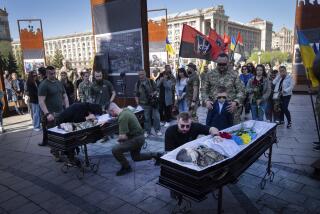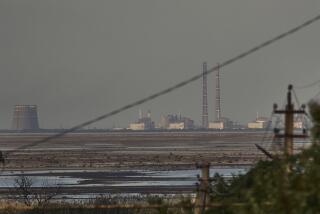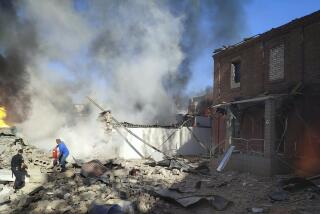18 in ‘Serious’ Condition, Soviets Say
- Share via
MOSCOW — The Soviet Union on Thursday listed 18 persons in “serious” condition as a result of the major nuclear accident at the Chernobyl power plant north of Kiev in the Ukraine.
No foreigners were injured by the explosion and fire in a nuclear reactor, the Soviet government said.
Meantime, citizens of Britain, France, Austria and some other countries left Kiev, about 60 miles south of the stricken plant, because of the possible radiation hazards.
In Moscow, the Kremlin briefed diplomats from Britain, France, Finland, Austria and other countries to try to convince them that the Chernobyl crisis was over. The envoys said afterward, however, that they learned little more than what was announced in the official Soviet press.
In a holiday-as-usual spirit, tens of thousands of Muscovites paraded in Red Square before Soviet leader Mikhail S. Gorbachev and other Politburo members without any sign of concern over the spread of radioactivity from the Soviet power station.
The controlled Soviet press and television continued to give scant, low-key coverage to the story that has dominated front pages and television newscasts around the world.
A statement by the Council of Ministers said that radioactivity at the Chernobyl plant and in a nearby residential area has dropped by 1.5 to 2 times. The statement did not, however, say what the radiation levels were before the drop.
“Work is under way to deactivate the contaminated areas adjacent to the (nuclear power station) territory,” according to the announcement, distributed by the official news agency Tass.
No Foreigners Affected
“Medical assistance is administered to those affected, of whom 18 people are in serious condition,” the statement added. “There are no foreign citizens among those affected.”
The Council of Ministers said Wednesday that 197 people were hospitalized after the disaster and that 49 were released after a medical examination. The government said Tuesday that two people were killed in what Western experts have called the world’s worst nuclear accident.
It also said that mass evacuations were carried out of people living in a settlement near the plant and three other nearby population centers.
Despite heavy criticism of the Soviet authorities for not releasing more information about the disaster, the government continued to withhold many details from the public and the world.
General assurances were given by Ukrainian officials that air and water quality were not affected by the Chernobyl accident, but no radiation measurements were provided to back up these assertions.
Foreign observers--including diplomats and journalists--continue to be barred from traveling to Kiev, much less to the nuclear power plant or the surrounding area.
In response to the virtual blackout of information, Britain advised its citizens to avoid travel to Moscow and the European part of the Soviet Union. The British Foreign Office said that Moscow has failed to respond to a request for detailed information about possible radiation hazards.
Meantime, a predominantly British group of 85 students who had been living in Kiev were tested for radiation at a Soviet clinic and declared fit.
More to Read
Sign up for Essential California
The most important California stories and recommendations in your inbox every morning.
You may occasionally receive promotional content from the Los Angeles Times.










